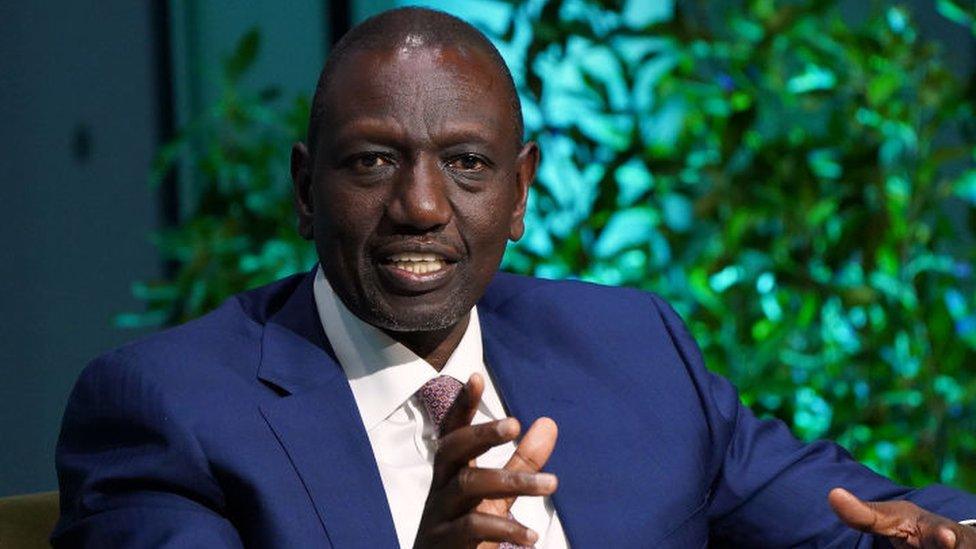Kenya healthcare: President William Ruto signs controversial UHC bills
- Published

President Ruto has taken a series of controversial measures since he took office last year
Kenya's President William Ruto has approved controversial legislation that will see the biggest shake-up of the health sector in more than 20 years.
His plan revolves around promoting universal healthcare, and requires all workers to contribute 2.75% of their salaries towards a new health fund.
The government says it will make healthcare more affordable and accessible for poorer Kenyans.
But it has proved unpopular with many Kenyans, who see it as a new tax.
They say it is the latest in a series of measures that Mr Ruto has introduced, worsening the cost-of-living crisis, despite the fact that he won elections last year with a promise to ease the financial difficulties of families.
Some also fear that the new healthcare fund will be beset by corruption, like the existing one, meaning they are often unable to access the health services they are entitled to.
But parliament has backed Mr Ruto, passing the Social Health Insurance Bill, along with three other health bills, on Tuesday.
Currently, Kenyans pay between 150 Kenyan shillings ($1; £0.80) and 1,700 shillings monthly to a National Health Insurance Fund (NHIF).
It will be replaced with a new fund, with the minimum contribution set to double and most salaried workers contributing a higher proportion of their pay.
With the new law, every Kenyan must register as a member of the Social Health Insurance Fund that replaces NHIF.
Mr Ruto says the universal health insurance will ensure that every Kenyan can go to the hospital and receive treatment without facing financial hardship.
The new laws, however, do not address what happens when individuals cannot afford contributions.
Kenya's Health Minister Susan Nakhumicha has said that the new plan is better as it "will allow Kenyans of all walks of life to contribute according to their income".
She said lower earners currently pay a higher percentage of their income than the better off.
Employers, who are required to match their employees' contributions, have opposed the 2.75% deduction as too high.
They say that it will hurt businesses and aggravate the cost-of-living crisis, which fuelled a wave of protests across Kenya earlier this year.
In June, Mr Ruto signed the Finance Act, another unpopular piece of legislation that introduced a 1.5% housing levy payable by both employers and employees, to help the government to provide affordable housing at a time when prices are so high that many urban Kenyans cannot afford to buy homes.
Some health and civil society organisations have also spoken out against the health plan, saying that the 2.75% deduction is substantial, considering the recent rise in fuel prices and living costs.
"This rate takes a lot more from distressed salaried citizens, whose incomes support large households of family and services," the Kenya Faith Based Health Services Consortium said in September.
Kenyans will be required to register to the proposed National Social Health Insurance Fund to access public health services and those who fail to enrol would be denied services.
The government will help Kenyans who cannot contribute towards the fund through a kitty of 26 billion shillings.
The new fund will replace the current NHIF, which has lost billions of taxpayer-contributed funds to corruption, denying many paying Kenyans access to healthcare.
Some Kenyans fear that the new fund will have more money, and there will be more corruption, while they will still be denied healthcare by the state.
Critics also fear that the new social healthcare body will spend most of the collected funds on administrative expenses like the current NHIF, leaving few resources for direct healthcare costs.
Additional reporting by Dorcas Wangira
- Published19 July 2023

- Published25 July 2022
